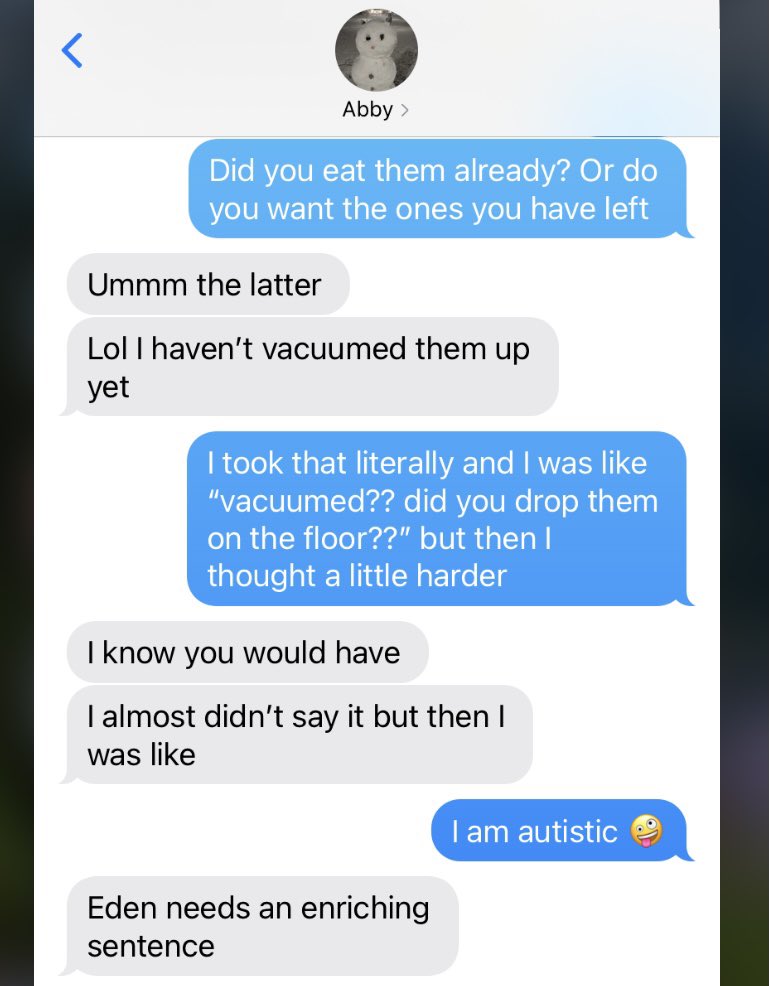
So-called “communicative deficits” in autism are often just the result of cross-neurotype interaction.
For those who want to learn more about autistic communication styles, I’ve compiled several studies that I’m going summarize.
Hopefully this will teach you a thing or two.
For those who want to learn more about autistic communication styles, I’ve compiled several studies that I’m going summarize.
Hopefully this will teach you a thing or two.
“Autistic peer-to-peer information transfer is highly effective” (2020)
Demonstrates that while NTs and autistics often experience communication breakdown, autistic people can convey and transfer information effectively among ourselves.
journals.sagepub.com/doi/full/10.11…
Demonstrates that while NTs and autistics often experience communication breakdown, autistic people can convey and transfer information effectively among ourselves.
journals.sagepub.com/doi/full/10.11…
A 2019 study demonstrated something similar:
Autistic people (generally) prefer to interact with other autistic people, and experience a greater feeling of connection with each other as compared to NTs. So, we’re capable of establishing social rapport.
journals.sagepub.com/doi/full/10.11…
Autistic people (generally) prefer to interact with other autistic people, and experience a greater feeling of connection with each other as compared to NTs. So, we’re capable of establishing social rapport.
journals.sagepub.com/doi/full/10.11…
A 2014 study of verbal creativity in autistic people found that we’re capable of comprehending metaphors to the same extent that NTs are, but that we tend to come up with more novel metaphors.
“The study points to unique verbal creativity in ASD.”
ncbi.nlm.nih.gov/pmc/articles/P…
“The study points to unique verbal creativity in ASD.”
ncbi.nlm.nih.gov/pmc/articles/P…
Another 2014 study found that autistic people tend to prefer nonsense/absurdist humor and wordplay, to a greater degree than NTs do.
These different preferences may explain why NTs often perceive autistic people as “lacking humor.”
sciencedirect.com/science/articl…
These different preferences may explain why NTs often perceive autistic people as “lacking humor.”
sciencedirect.com/science/articl…
Here’s a 2007 paper (relevant to autism) about humor in a cross-cultural context, which demonstrates that misunderstanding and a so-called “lack of humor” is often the result of different cultural expectations.
I’ll quote the paper in the next slide.
degruyter.com/view/journals/…
I’ll quote the paper in the next slide.
degruyter.com/view/journals/…
“Maori participants regularly mentioned that Pakeha humor was different and that Pakeha did not understand Maori jokes...
The reverse was not found, because Pakeha, as the dominant group, did not need to adjust to Maori norms, which thus went unnoticed.”
(Bell, 2007)
The reverse was not found, because Pakeha, as the dominant group, did not need to adjust to Maori norms, which thus went unnoticed.”
(Bell, 2007)
The power dynamic at play in who decides what is funny & what isn’t, is extremely relevant to studies on autism.
Just because NTs don’t always perceive us as funny, doesn’t mean we aren’t.
It means they’re the dominant cultural group, and we approach humor differently.
Just because NTs don’t always perceive us as funny, doesn’t mean we aren’t.
It means they’re the dominant cultural group, and we approach humor differently.
And here’s a 2008 paper about autistic culture and communication.
It discusses how the creation of the internet has served as a communicative equalizer for autistic people, as well as a platform for the development of our culture.
researchgate.net/publication/24…
It discusses how the creation of the internet has served as a communicative equalizer for autistic people, as well as a platform for the development of our culture.
researchgate.net/publication/24…
Autistic people, like Deaf people, are a sociolinguistic group with our own culture and norms of communication.
The communicative burden in conversation between autistic people and NTs should not fall solely on autistic people.
Communication requires effort on all sides.
The communicative burden in conversation between autistic people and NTs should not fall solely on autistic people.
Communication requires effort on all sides.
• • •
Missing some Tweet in this thread? You can try to
force a refresh




